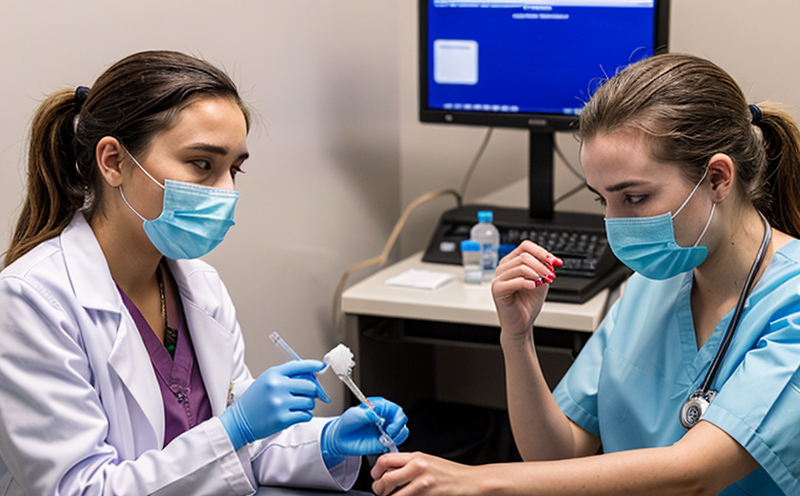CDC Norovirus Detection in Clinical Microbiology
The Centers for Disease Control and Prevention (CDC) defines noroviruses as a group of viruses that cause acute gastroenteritis. These viruses are the leading cause of foodborne illness outbreaks in the United States, affecting millions annually. In clinical microbiology laboratories, accurate detection of norovirus is crucial to ensuring public health safety by identifying sources of contamination and preventing further spread.
The process of detecting noroviruses involves several critical steps that are essential for reliable diagnosis and reporting. The initial step is the collection and processing of specimens from patients suspected of having norovirus infection. This typically includes stool samples, which must be handled with care to maintain the integrity of viral particles during transport.
Following specimen collection, laboratories employ nucleic acid amplification tests (NAATs) such as reverse transcription-polymerase chain reaction (RT-PCR), which are sensitive and specific for detecting norovirus RNA. NAATs allow for rapid detection, even at low viral concentrations, ensuring timely diagnosis. Laboratories may also use antigen detection assays or immunoassays to identify antibodies against noroviruses.
Once the samples have been processed, they undergo a series of quality control measures to ensure accuracy and reliability. This includes calibration of instruments, standardization of reagents, and adherence to strict protocols. Compliance with international standards such as ISO 15189 for medical laboratories is essential in maintaining high-quality testing practices.
The results from these tests are then reported according to CDC guidelines, providing healthcare providers with crucial information necessary for patient management and public health measures. Proper reporting helps in the containment of outbreaks and informs public health interventions such as quarantine protocols and disinfection procedures.
Accurate norovirus detection is not only vital for individual patients but also plays a significant role in preventing further spread within communities. By identifying contaminated food or water sources, laboratories can contribute to reducing the incidence of norovirus-related illnesses. This makes it an indispensable service in any comprehensive clinical microbiology laboratory.
Moreover, the continuous advancement in molecular diagnostic techniques ensures that laboratories are equipped with the latest technology to meet stringent regulatory requirements and deliver reliable results. The commitment to quality and precision is paramount in ensuring patient safety and public health.
Quality and Reliability Assurance
The success of norovirus detection services relies heavily on robust quality assurance measures that ensure the accuracy, reliability, and consistency of test results. Laboratories adhere strictly to international standards such as ISO 15189 for medical laboratories, which mandate stringent protocols and quality management systems.
Regular internal audits and external accreditation checks are conducted to verify compliance with these standards. This includes periodic calibration of instruments used in the testing process, ensuring that they function within specified tolerances. Laboratories also participate in proficiency testing programs organized by recognized bodies like the College of American Pathologists (CAP) or the European Federation for Clinical Chemistry and Laboratory Medicine (EFCCC).
Continuous training and education are provided to staff members to keep them updated on the latest techniques and methodologies. This enhances their skills and ensures they can effectively perform complex tests while maintaining high standards.
The use of validated protocols and standard operating procedures further reinforces the reliability of test results. These documents provide clear instructions for sample handling, processing, and analysis, minimizing errors and discrepancies. Furthermore, strict adherence to these guidelines helps in achieving consistent and reproducible outcomes across different batches of samples.
Quality assurance extends beyond technical aspects; it encompasses patient care as well. Laboratories strive to minimize turnaround times, ensuring prompt reporting of results to healthcare providers who can then initiate appropriate treatment plans promptly. Timely communication with clients about the status of their tests fosters trust and satisfaction among stakeholders.
Customer Impact and Satisfaction
The impact of accurate norovirus detection extends far beyond just clinical outcomes; it significantly influences patient care, public health, and overall community well-being. For healthcare providers, timely diagnosis enables early intervention strategies that can reduce the duration and severity of illness.
Prompt identification allows for isolation protocols to be implemented effectively, preventing further transmission within hospitals or institutions. This proactive approach helps protect vulnerable populations such as elderly individuals or those with compromised immune systems who are at higher risk from norovirus infections.
From a public health perspective, reliable testing aids in outbreak investigations by pinpointing the source of contamination quickly. Such insights enable targeted control measures like cleaning and disinfection procedures to be implemented swiftly, thereby minimizing the geographic spread of the virus.
Laboratories play a pivotal role in enhancing customer satisfaction through their commitment to excellence. By delivering accurate results promptly, they contribute positively towards improved patient experiences and better clinical decision-making processes. Positive feedback from satisfied clients strengthens relationships between laboratories and healthcare partners, promoting long-term collaborations aimed at improving public health standards.
International Acceptance and Recognition
The global recognition of norovirus detection services underscores their importance in maintaining public health standards worldwide. Internationally accepted guidelines from organizations like the World Health Organization (WHO) emphasize the significance of accurate norovirus testing for effective disease surveillance and control.
Laboratories accredited by bodies such as CAP or EFCCC are widely recognized for adhering to stringent quality assurance protocols, ensuring consistent high standards across different regions. This international acceptance enhances confidence in laboratory services globally, facilitating smoother collaboration between countries during health crises.
Adherence to global best practices ensures that test results from one country can be readily accepted by others without additional testing or verification processes. This interoperability fosters a unified approach towards managing infectious diseases on a larger scale.





